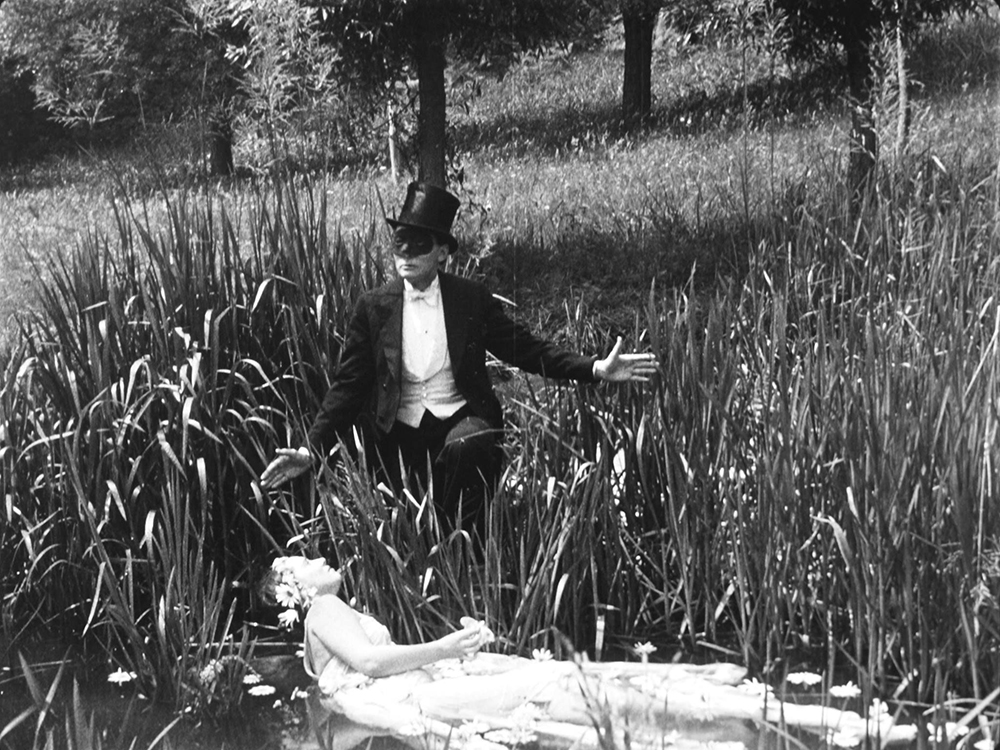
“Everything is light-hearted and lovely in this film, with intertitles few in number but nevertheless worthy of Tzara or Breton”
Dominique Païni
“The rather obscure figure of Ernst Moerman is, if possible, even more eccentric. He is described by his friend, writer Robert Goffin as ‘an extraordinary person, with poetry expressing itself in every gesture of his life’. Moerman, who was born in 1897, died at age 46 in 1944. An absolutely passionate surrealist, his life was not only short but quite uneven – he ended his days living in a caravan. Like [Henri] d’Ursel, he too was close to the Parisian surrealist group in the 1920’s, and there he became a close friend of the poet Paul Eluard. In fact, Eluard’s Capitale de la douleur (1926) – heavily quoted in Jean-Luc Godard’s noirish sci-fi film Alphaville (1965) - is visually quoted in Moerman’s one and only film: Monsieur Fantômas.
[...]
Moerman’s film was shown for the first time by the Cercle du Cinéma, a left-wing film society in Brussels, at the Palais des Beaux-Arts on October 12th, 1937. Monsieur Fantômas was screened on the same programme as Buñuel’s Un Chien andalou, which seems a good choice as both films have elements in common. First of all, they are both consciously immoral acts of savagery, partly sadistic, partly intellectual satires, with religion and love as their two main objects of attack. It is self-evident that both of them can be described as furiously anticlerical – Buñuel and Moerman were well-known for their virulent, lifelong anti-clericalism. But whereas Monsieur Fantômas proves to be a satirical indictment of the church in the style of a parody, Buñuel’s critique goes way beyond that, emerging as something considerably more merciless. In the case of Moerman’s film, Raymond Borde asserts that its anticlericalism comes from an ancient tradition in Belgian culture, from the famous medieval Carnival at Binche to the works of James Ensor.
Santiago Rubín de Celis1
Je ne sais pas très bien qui je suis.
Mes questions, dans le ciel, semblent
Et tout le monde a l’air si pressé ici.
Pourquoi ferais-je comme eux?
Ma place est réservée, dans la mort.
« Mille ans de la vie d’un oiseau » de Ernst Moerman
« Trop de gens confondent encore la poésie et les vers, la poésie et un recueil de poèmes. Constater qu’il ne viendra plus à l’idée de personne d’entrer chez un libraire pour y acheter un volume de vers et en conclure que la poésie n’intéresse qu’une infime minorité, est une erreur. Il serait plus sage de se demander si, présentée sous une autre forme, elle ne réussirait pas mieux à reprendre dans le cœur de tout homme la place que, secrètement, il lui a toujours gardée. »
Ernst Moerman2
- 1Santiago Rubín de Celis, “One Time Magic: The Film Adventures of Ernst Moerman and Henri d’Ursel,” Experimental Conversations, Issue 7: Summer 2011.
- 2Ernst Moerman dans le numéro spécial du 29 septembre 1937 de la revue Le rouge et le noir, cité sur www.maisondelapoesie.be.[/fn]

